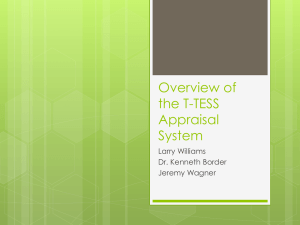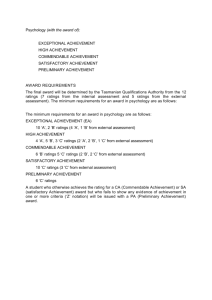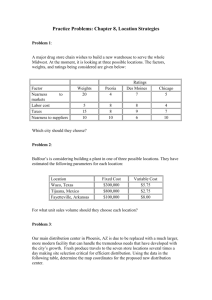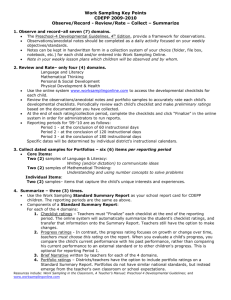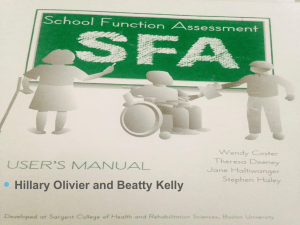Felder`s "What do they know anyway?"
advertisement
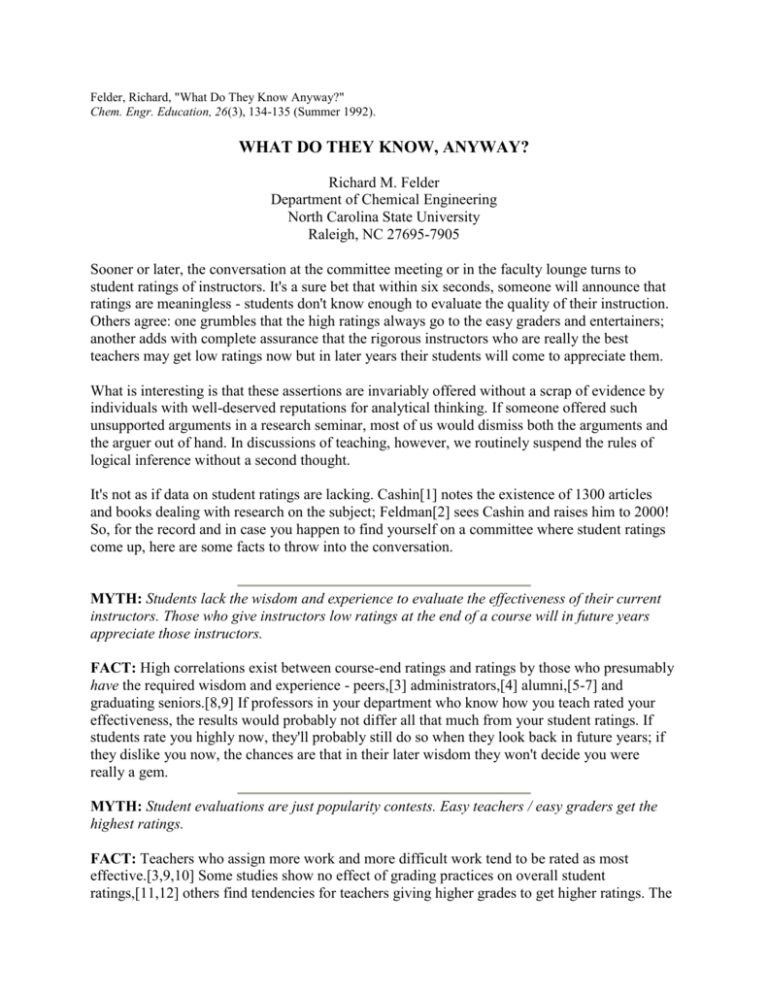
Felder, Richard, "What Do They Know Anyway?" Chem. Engr. Education, 26(3), 134-135 (Summer 1992). WHAT DO THEY KNOW, ANYWAY? Richard M. Felder Department of Chemical Engineering North Carolina State University Raleigh, NC 27695-7905 Sooner or later, the conversation at the committee meeting or in the faculty lounge turns to student ratings of instructors. It's a sure bet that within six seconds, someone will announce that ratings are meaningless - students don't know enough to evaluate the quality of their instruction. Others agree: one grumbles that the high ratings always go to the easy graders and entertainers; another adds with complete assurance that the rigorous instructors who are really the best teachers may get low ratings now but in later years their students will come to appreciate them. What is interesting is that these assertions are invariably offered without a scrap of evidence by individuals with well-deserved reputations for analytical thinking. If someone offered such unsupported arguments in a research seminar, most of us would dismiss both the arguments and the arguer out of hand. In discussions of teaching, however, we routinely suspend the rules of logical inference without a second thought. It's not as if data on student ratings are lacking. Cashin[1] notes the existence of 1300 articles and books dealing with research on the subject; Feldman[2] sees Cashin and raises him to 2000! So, for the record and in case you happen to find yourself on a committee where student ratings come up, here are some facts to throw into the conversation. MYTH: Students lack the wisdom and experience to evaluate the effectiveness of their current instructors. Those who give instructors low ratings at the end of a course will in future years appreciate those instructors. FACT: High correlations exist between course-end ratings and ratings by those who presumably have the required wisdom and experience - peers,[3] administrators,[4] alumni,[5-7] and graduating seniors.[8,9] If professors in your department who know how you teach rated your effectiveness, the results would probably not differ all that much from your student ratings. If students rate you highly now, they'll probably still do so when they look back in future years; if they dislike you now, the chances are that in their later wisdom they won't decide you were really a gem. MYTH: Student evaluations are just popularity contests. Easy teachers / easy graders get the highest ratings. FACT: Teachers who assign more work and more difficult work tend to be rated as most effective.[3,9,10] Some studies show no effect of grading practices on overall student ratings,[11,12] others find tendencies for teachers giving higher grades to get higher ratings. The latter result does not invalidate the ratings, however; as McKeachie[11] observes, if students learn more from a teacher, one would expect their grades and their ratings to be higher. MYTH: Even if student evaluations have some validity, there's no value in the multiple-choice forms used to collect most of them. You've got to interview students and ask open-ended questions for the results to mean anything. FACT: Comparisons have been run on student ratings collected in three different ways: objective questionnaire items, written responses to open-ended questions, and group interviews. The average correlation among the rating methods was 0.86.[13] MYTH: Teachers who get high ratings aren't really doing a better job of teaching. FACT: Teachers rated as effective by students tend to be those whose students perform best on achievement tests.[3] Classes in which students give instructors higher ratings when multiple sections are taught tend to be those in which the students score higher on common external exams.[1] Good teaching also motivates interest and desire to learn.; students in courses taught by highly-rated teachers are subsequently more likely to elect advanced courses in the same subjects[14] and to major in those subjects.[15] MYTH: Student evaluations don't improve teaching. FACT: Students of instructors who got student feedback scored higher on achievement tests and assessments of motivation for learning than students of instructors who got no feedback.[16] In short, the research shows that student evaluations of an instructor provide a reliable, valid assessment of that instructor's teaching effectiveness, especially if they reflect the views of many students in several different course offerings. So, next time someone says that there's no good way to evaluate teaching, quietly mention that one or two thousand research studies on the topic suggest otherwise. You may not change anyone's mind on the spot, but it might raise the discussion to a higher level than it usually occupies. It remains to consider how evaluations can be structured to have the maximum impact on teaching effectiveness. That's another column. Reference 1. Cashin, W.E., "Student Ratings of Teaching: A Summary of the Research," Center for Faculty Evaluation and Development, Kansas State University, September (1988). 2. Feldman, K., quoted in The Teaching Professor, p. 5, December (1990). 3. Marsh, H.W., Students' Evaluations of University Teaching: Research Findings, Methodological Issues, and Directions for Future Research, Pergamon Press, Elmsford, NY (1987). 4. Kulik, J.A. and W.J. McKeachie, "The Evaluation of Teachers in Higher Education," in Review of Research in Education, Vol. 3, F.N. Kerlinger, ed., Itasca, IL, F.E. Peacock, p. 210 (1975). 5. Centra, J.A., "The Relationship Between Student and Alumni Ratings of Teachers," Educational and Psychological Measurement, 34(2), 321 (1974). 6. Drucker, A.J., and H.H. Remmers, "Do Alumni and Students Differ in Their Attitudes Toward Instructors?" J. Ed. Psych., 42, 129 (1980). 7. Overall, J.U., and H.W. Marsh, "Students' Evaluations of Instruction: A Longitudinal Study of Their Stability," J. Ed. Psych., 72, 321 (1980). 8. Aleamoni, L.M., "Student Ratings of Instruction," in Handbook of Teacher Evaluation, J. Millman, Ed., Sage, Beverly Hills, CA, p. 110 (1981). 9. Marsh, H.W., "Students' Evaluations of University Teaching: Dimensionality, Reliability, Potential Biases, and Utility," J. Ed. Psych., 76, 707 (1984). 10. "Applicability Paradigm: Students' Evaluations of Teaching Effectiveness in Different Countries," J. Ed. Psych., 78, 465 (1986). 11. McKeachie, W.J., Teaching Tips, D.C. Heath, Lexington, MA (1986). 12. Palmer, J., G. Carliner, and T. Romer, "Leniency, Learning, and Evaluation," J. Ed. Psych., 70(5), 855 (1978). 13. Ory, J.C., L.A. Braskamp, and D.M. Pieper, "Congruency of Student Evaluative Information Collected by Three Methods," J. Ed. Psych., 72, 181 (1980). 14. Marsh, H.W. and D. Solomon, "Student Ratings of Instructors: A Validity Study," J. Ed. Research, 51, 379 (1958). 15. Sullivan, A.M., and G.R. Skanes, "Validity of Student Evaluation of Teaching and the Characteristics of Successful Instructors," J. Ed. Psych., 66, 584 (1974). 16. Overall, J.U., and H.W. Marsh, "Midterm Feedback from Students: Its relationship to Instructional Improvement and Students' Cognitive and Affective Outcomes," J. Ed. Psych., 71, 856 (1979). felder@eos.ncsu.edu


